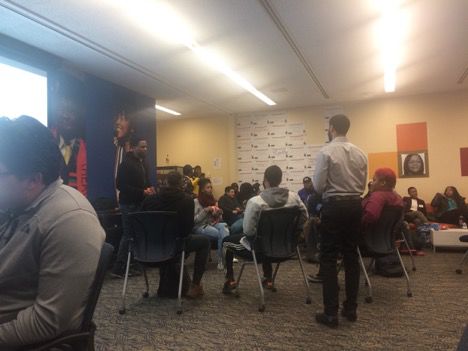Male Empowerment Network holds its first female inclusive event

Students circle around during small group sessions to talk about the treatment of women. This is the first time M.E.N. has included women.
March 14, 2018
Respect, chivalry and treatment were just a few themes the Male Empowerment Network highlighted during its “How She Wants to be Treated” event Tuesday night.
“We’re trying to get to an understanding,” Michael Daniels, the Student Multicultural Center project coordinator said. “We can’t sit here and talk about how women want to be treated without having people who identify as women in the room.”
The event took place in the Student Multicultural Center; women were invited to attend the meeting for the first time in the organization’s history.
Ile-Ife Okantah, a senior magazine journalism major and Aceani Ross-Bigbee, a junior fashion merchandising major, helped facilitate the female perspective.
“Historically, we have not been allowed in male only zones, and I think when you don’t allow people into the space then their problems don’t become relevant,” Okantah said. “We all need to be aware of the great things that women do.”
President of M.E.N., Donovan Vaughn thought of the event as a way to honor women during Women’s History Month.
“Making sure we understand them as much as possible and making sure we cater them as well as possible,” Vaughn said. “It makes the world go round.”
Vaughn proposed questions focused on how to properly engage with women and the mistakes men sometimes make.
“Not only have I experienced disrespect, but people really second-guessing my credentials or my amount of expertise and connections in the industry,” Ross-Bigbee said. “And a lot of times it does come from men, because whatever reason, men feel that they are on a higher pedestal.”
Kaela Staples-Still, a senior theatre studies major, attended the event to gain a new perspective and to voice her opinion.
“Treat me how you would treat your mother,” Staples-Still said. “If you don’t have a mother, then treat me how you would want your daughter to be treated. Treat me with respect that’s all I ask.”
Faith Riggs is the Women and Gender Issues reporter. Contact her at [email protected].
























